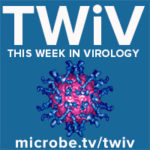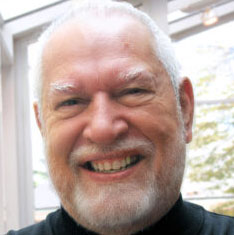David Esteban writes:
Dear TWiV folks,
I hope that you will take a moment to highlight the recent paper from Ian Lipkin’s lab identifying biomarkers for CFS/ME. (The Institute of Medicine has recommended a name change, to Systemic Exertion Intolerance Disease, SEID, to better reflect the primary symptom.) The paper is not exactly a fun read, unless you love acronyms or know all the cytokines really well, but I think its an important paper and one that TWiV listeners might be interested in. There isn’t really any virology, but given the coverage of the XMRV story on TWiV, it might be worth noting this development in the understanding of CFS/ME.
The study identifies immune biomarkers in CFS/ME patients. The study was quite large and importantly, separated patients by duration of illness. This turned out to be critical, as early (3 years or less) and late stages of disease appear to be quite different. They analyzed the levels of 51 cytokines. Many of these were significantly elevated in short duration patients compared to controls and long-duration patients, and included both pro- and anti-inflammatory cytokines. Long duration subjects showed the opposite trend, that of having many cytokines at lower levels than controls. Among these was IFN-gamma, which has been found to be elevated in other cases of post-viral fatigue. Interestingly, CD40L, found mainly on Th-cells and a regulator of many of these cytokines, was more abundant in long-duration and less abundant in short duration subjects, compared to controls. There is much more covered and discussed in the paper but I think these are really the take-home messages.
The authors suggest that the high IFNg and cytokine network disturbance may be triggered by a viral infection. Many CFS/ME patients report having had infectious mononucleosis (caused by EBV) before developing CFS, and some studies have found high antibody titers to EBV and HHV-6 associated with CFS (there’s the virology for you). I expect that there are likely many different triggers, not limited to viruses . After three years of over-stimulation, the authors suggest the cytokine producing cells become “exhausted,” leading to the lower levels of production. I’m not sure what exhaustion means on a cellular or molecular level, though.
Identifying biomarkers is certainly not finding the cause of the disease. But given that until now CFS/ME has been such a mystery, this is a major step in a good direction, and presents many avenues for potentially productive research on the disease. At the very least, discovery of biomarkers for CFS/ME will help patients, doctors, and everyone else to recognize that this is a real disease with a biological basis. I think it is safe to assume that all people with CFS/ME have had the experience of doctors, friends, and family not taking their disease seriously. The discovery of biomarkers gives legitimacy to what patients have known all along: even if you can’t identify what is wrong, doesn’t mean there isn’t something wrong.
http://advances.sciencemag.org/content/1/1/e1400121
Cheers
Robin writes:
Weather calculator
http://www.srh.noaa.gov/epz/?n=wxcalc
Johnye writes:
Please see the poster at the bottom. While addressing measles specifically, it expresses my hopes that parents and other adults will act responsibly and do all THEY can to protect children, and themselves, against vaccine preventable diseases and illness.
Johnye
Johnye Ballenger, M. D., FAAP
West Cambridge Pediatric and Adolescent Medicine
Cambridge, MA
Begin forwarded message
From: AAP News <no-reply@aap.org>
Subject: Latest News: As measles cases spread, state legislatures respond
Ross writes:
Hi there TWiVocytes. I’m celebrating a lovely day here in Brisbane with blue skies, 34oC and an unusually bearable 40% humidity by spending the whole day indoors doing research for a literature review. I am just embarking on my research journey as an honours student studying Dengue Virus and of course I would like my writing to be effective as possible. This got me to thinking that a couple of years ago Rich and Alan mentioned a book that they highly recommended when it came to a guide for good scientific writing, unfortunately I cannot remember on which episode this recommendation was made. I was wondering if you could relay that recommendation back to me again?
Also if you would like a recommendation for a listener pick of the week, this series of three comics from the “PhD Comic” regarding Nature vs Science are quite entertaining and informative.
http://www.phdcomics.com/comics/archive.php?comicid=1199
http://www.phdcomics.com/comics/archive.php?comicid=1200
http://www.phdcomics.com/comics/archive.php?comicid=1201
Regards,
Ross
Honours Student
Institute of Health and Biomedical Innovation
John writes:
I hope you can cover this breaking news out of Germany on TWiV. The European CDC has detected a new virus in three German pet squirrel breeders who died of encephalitis. The virus was also present in one of their squirrels.
Reference:
“New bornavirus strain in EU detected, following encephalitis cases in
variegated squirrel breeders in Germany”
http://www.ecdc.europa.eu/en/press/news/_layouts/forms/News_DispForm.aspx?List=8db7286c-fe2d-476c-9133-18ff4cb1b568&ID=1178
http://www.ecdc.europa.eu/en/publications/Publications/new-bornavirus-strain-detected-EU-rapid-risk-assessment.pdf
The squirrel, Sciurus variegatoides, is the common peridomestic squirrel of Central America. It frequently comes into contact with humans. If it carried a communicable, deadly virus in its native land we would have noticed.
John
P.S. In TWiV 326 Rich felt that 15 C was cold weather for bicycling. One of my coworkers rides to work even at -15 C, the morning temperature for much of February near Boston. But all good things must come to an end. Although it is snowing as I write this, above-freezing days mark the end of an excellent winter. If you like watching snow melt you can follow the decline on the NOAA web site:
Jon writes:
Dear TWIV,
Your listeners may not have realized it, but they may already have a way around the paywalls to numerous journals through their alumni status at different universities.
For example, UCLA alumni get access to proquest (full text for some journals, including NATURE):
http://alumni.ucla.edu/join/benefits/library.aspx
University of Texas gets you JSTOR (all full text) and EBSCO (lots of journals, some full text)
https://www.texasexes.org/get-informed/library-access.aspx
Princeton gets you JSTOR, Proquest, and elibrary academic complete (with 75K full-text books):
http://library.princeton.edu/alumni/online-resources
MIT gets you JSTOR (and perhaps more)
http://kb.mit.edu/confluence/display/mitcontrib/MIT+Alumni+access+to+JSTOR
ect.
Caroline writes:
Unfortunately, it’s not about the facts. We need the psych department to join the science department to see progress in this area.
http://www.scientificamerican.com/article/why-people-fly-from-facts/
Anne Marie writes:
Hi there,
I just wanted to share a cross stitch I made this month that I thought you all would enjoy. (:
My best,
Anne Marie
Ricardo writes:
Hello TWIV friends.
Once again I’m sending a pick for TWIV.
It’s a small movie of Hans Rosling & Bill Gates that ends like this…
“Explaining the global vaccination programs is NOT a party-killer! It’s a Party Trick!”
Once again thank you for your hard work.
http://www.gapminder.org/videos/demographic-party-trick-1-with-bill-gates/
Ricardo Magalhaes, Ph.D.
Associate Professor of Microbiology
********************************************************
Faculty of Health Sciences of Fernando Pessoa University
Portugal











One comment on “TWiV 329 letters”